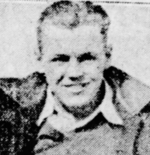 The St. Louis Star and Times, December 13, 1932. 19-year-old Maurice Taff and another teenager, William L. Eiseman, were arrested and charged with the April 4, 1931 armed robbery of a dry goods shop in St. Louis, Missouri. The owner of the store, Mrs. Helen Benderoth, and another eyewitness identified Taff as one of the robbers. Police reported that Taff and Eiseman had confessed to the crime, but Taff soon repudiated such confession, providing the alibi defense that he had been in Waynesville, Missouri, at the time of the robbery. At trial, Taff offered the testimony of several Waynesville residents, who stated that they had seen him in Waynesville on the day of the crime. On November 28, 1931, Taff was convicted of armed robbery and sentenced to ten years in prison. After Taff’s trial, Eiseman admitted that his accomplice in the robbery was his younger brother, Donald, and Taff had not been involved. Convinced of Taff's innocence, Governor Henry S. Caufield granted him an unconditional pardon on December 12, 1932. When interviewed upon his release, Taff said he had confessed to avoid being beaten by police and had trusted that the jury would believe his alibi. In early 1933, Taff appeared in front of the Missouri House Appropriations Committee to ask for a $2,000 appropriation as compensation to his parents, who had spent all their savings and mortgaged their home to pay for Taff’s legal representation in attempting to establish his innocence. Representative A.L. McCawley stated that this was the first such request made by a person wrongfully convicted of a crime. The outcome of Taff’s request for this appropriation is unknown. – Meghan Barrett Cousino
|